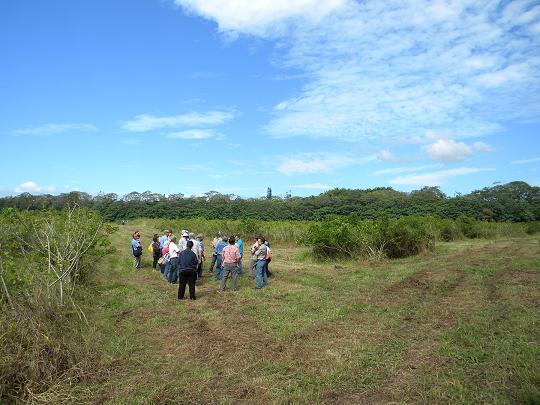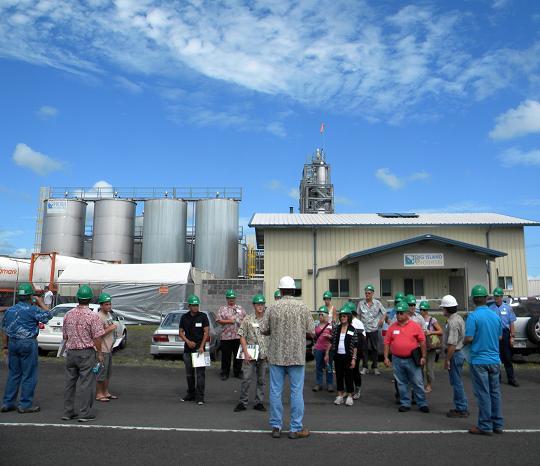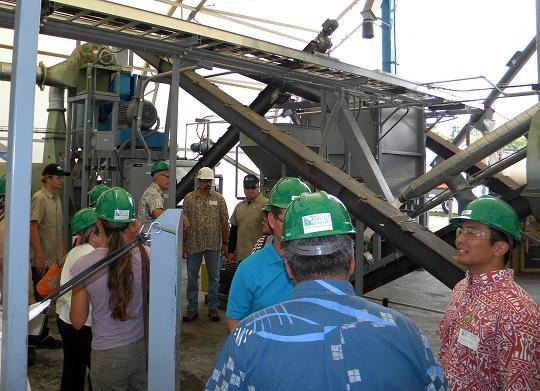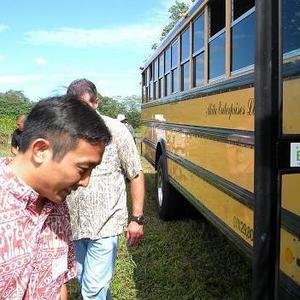Pacific Biodiesel, HIPPO host Hawaii sustainable agriculture tour





Photo: Pacific Biodiesel Technologies
October 14, 2013
BY Pacific Biodiesel Technologies
On Oct. 10, Pacific Biodiesel, Big Island Biodiesel and Hawaii Pure Plant Oil hosted a tour to exhibit the community-based biofuel production model that is developing on Hawaii Island—a model that undeniably supports green jobs, local agriculture, the livestock industry and the community.
Guests representing various facets of the local community attended the event, from state legislators to farmers, ranchers and biodiesel fuel consumers. Among those in attendance were Sen. Russell Ruderman, Rep. Richard Onishi and Sen. Gilbert Kahele.
Advertisement
With many of the pieces now in place, farmers, ranchers and biofuel producers hope to garner state support of this expanding community-based production chain. State and federal support will foster more local farming, ranching, production jobs and the involvement of the local community in sustainable, renewable energy creation, growing the local economy, keeping Hawaii green and working to achieve the state’s clean energy goals. The tour was broken into three segments.
The Hawaii Pure Plant Oil farm was founded in 2008 by father and son team Christian and Jamie Twigg-Smith who planted a total of 200 acres of jatropha with the intent of harvesting its seeds and extracting the oil for biodiesel production.
Now, five years after the farm’s inception, the Twigg-Smiths have formed a direct collaboration with Pacific Biodiesel Technologies under its federally funded Hawaii Military Biofuel Crop project. The project involves developing production models for jatropha and other potential biofuel crops such as sunflower, safflower and camelina, to share with potential biofuel crop growers throughout the state.
Advertisement
Seed crushing in Hawaii is made possible by HMBC’s recently installed seed crushing mill—the first of its kind in the state—which has the capability to process a wide variety of seeds and nuts from sunflower and soy bean to jatropha and kukui. Waste agriculture such as unusable macadamia nuts has also been incorporated at the request of local farming operations that are hoping to expand the market for their less-than-perfect produce. The byproduct of this crush is a high-protein meal that is already being sought after by ranchers as a feed supplement for Hawaii’s livestock industry.
Oil from crops crushed at the mill is sent next door to PBT’s newest biodiesel production facility, Big Island Biodiesel. The facility boasts multifeedstock processing technology as well as high-vacuum distillation that enables production of the highest quality biodiesel in the world. Byproducts of the biodiesel refining process, such as glycerin, can be utilized locally in various applications.
Related Stories
Operable U.S. biofuel production capacity expanded slightly in March, according to data released by the U.S. Energy Information Administration on May 30. Feedstock consumption was up when compared to the previous month, but down from March 2024.
A notice published in the Federal Register by the U.S. EPA indicates that far fewer parties than originally anticipated have registered with the agency as biointermediate producers under the Renewable Fuel Standard.
With exclusive licensing to a camelina seed variety, Ash Creek Renewables is breaking down barriers to a renewable future.
The USDA reduced its estimate for 2024-’25 soybean use in biofuel production in its latest WASDE report, released May 12. The agency expects soybean oil use in biofuel to increase during the 2025-’26 marketing year.
HutanBio's microalgal biofuel production shown to be net-negative in an independent life cycle assessment by EcoAct
HutanBio on May 8 announced that the production process for its proprietary HBx microalgal biofuel achieves net-negative carbon emissions, based on an independent cradle-to-gate life cycle assessment (LCA) conducted by EcoAct.
Upcoming Events










